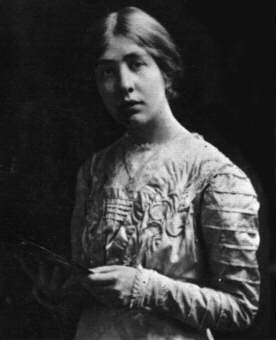
|
E. Sylvia PankhurstSuffragettes 1914
|
First World Warmongers – White feathers – Homes for girl babies not boy babies – “Women would stand for peace!” then fervent support for war
The W.S.P.U. reappeared after a brief interval which seemed an age in those rapidly moving days. It had now entirely departed from the Suffrage movement. Giving its energies wholly to the prosecution of the War, it rushed to a furious extreme, its Chauvinism unexampled amongst all the other women’s societies.
On September 8th, 1914, Christabel re-appeared at the London Opera House, after her long exile, to utter a declaration, not on women’s enfranchisement, but on “The German Peril.” Mrs. Pankhurst toured the country, making recruiting speeches. Her supporters handed the white feather to every young man they encountered wearing civilian dress, and bobbed up at Hyde Park meetings with placards: “Intern Them All.” The Suffragette appeared again on April 16th, 1915, as a war paper, and on October 15th changed its name to Britannia. There week by week Christabel demanded the military conscription of men, and the industrial conscription of women, “national service” as it was termed. In flamboyant terms she called also for the internment of all people of enemy race, men and women, young and old, found on these shores, and for a more complete and ruthless enforcement of the blockade of enemy and neutral nations. She insisted that this must be “a war of attrition.” In her ferocious zeal for relentless prosecution of the War, she demanded the resignation of Sir Edward Grey, Lord Robert Cecil, General Sir William Robertson and Sir Eyre Crowe, whom she considered too mild and dilatory in method. So furious was her attack that, in its over-fervent support of the National War policy, Britannia was many times raided by the police, and experienced greater difficulty in appearing than had befallen the Suffragette. Indeed it was compelled at last to set up its own printing press. A gentler impulse was embodied in an early proposal of Mrs. Pankhurst to set up Women’s Social and Political Union Homes for illegitimate girl “war babies,” but only five children were adopted. Sterner interests prevailed. Lloyd George, whom Christabel had regarded as the most bitter and dangerous enemy of women, was now the one politician in whom she and Mrs. Pankhurst placed confidence.
When the first Russian Revolution took place and Kerensky rose to power, Mrs. Pankhurst – like many others – journeyed to Russia, in the vain effort to prevent that vast country with its starving multitudes from retiring from the War. Her circuit was like that of Hervé, the French “anti-patriot,” as for many years he had called himself, and of whom she had been an ardent admirer in her youth. Christabel received the commendation of many war enthusiasts. Lord Northcliffe observed that she ought to be in the Cabinet. Lord Astor told me, when I happened to be seated beside him at dinner, that he had received two letters from her; he had sent one of them to the War Office, the other to the Minister of Blockade. Undoubtedly he was much impressed by their contents.
When first I read in the Press that Mrs. Pankhurst and Christabel were returning to England for a recruiting campaign I wept. To me this seemed a tragic betrayal of the great movement to bring the mother-half of the race into the councils of the nations. “Women would stand for peace!” How often, how often had they and all of us averred it!
My own activities were no more to their taste than theirs to mine, and I was publicly repudiated by Mrs. Pankhurst, through the medium of the Press. Adela in Australia was working with Vida Goldstein in the Women’s Party there much as I was doing here. She took a prominent part in opposing Conscription and in securing its defeat when submitted to Referendum. She, too, was publicly repudiated by Mrs. Pankhurst. (pp. 593-595.)
E. Syvia Pankhurst, The Suffragette Movement: An Intimate Account of Persons and Ideals, Longmans, London, 1931